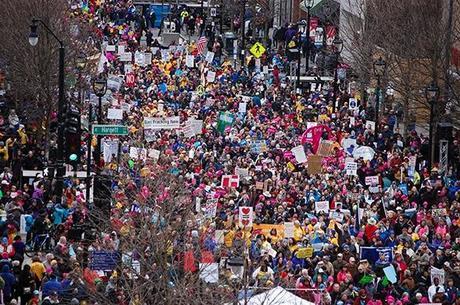
An important meme is developing about the Moral Monday marches in North Carolina regarding which I blogged glancingly several days ago. In the latest development in this movement uniting people of faith and others working for progressive goals in the Southern swing state of North Carolina whose legislature and governor's office are now dominated by hard-right Republicans, more than 100,000 people marched on the state capitol in Raleigh Saturday.
Ira Chernus reports for Common Dreams:
They weren't just marching for one issue or another. They were marching for every issue progressives care about: economic justice; a living wage for every worker; support for organized labor; justice in banking and lending; high quality, well-funded, diverse public schools; affordable health care and health insurance for all, especially women; environmental justice and green jobs; affordable housing for every person; abolishing the death penalty and mandatory sentencing; expanded services for released prisoners; comprehensive immigration reform to provide immigrants with health care, education, and workers rights; insuring everyone the right to vote; enhancing LGBT rights; keeping America's young men and women out of wars on foreign soil; and more.
And as Chernus concludes,
Those nearly 100,000 Moral Marchers in Raleigh pose crucial questions to progressives across America: Are we ready to move beyond our own issues to join a unified, strategically savvy progressive movement encompassing every issue? And are we willing to do what it takes for that movement to succeed: to drop our suspicion of religion, to lift up the word "moral" as a bridge across the religious-secular divide, to judge religious progressives by the content of their policies and not the color of their vocabulary?
That's the meme to which I'm referring in the opening sentence of this posting: American progressives have been adroit about separating themselves into religious and non-religious enclaves, black groups and white ones, straight ones, gay ones. They have significantly contributed to the impotence of their movements by aiming their weapons at each other instead of at the draconian systems of injustice they're battling to change, while they yield the term "moral" to those who keep these draconian systems in place.
If progressives are going to make a dent in American culture and the American political system now, they need, as Chernus notes, to stop the divisive tactics of ideological purism which read one group of fellow progressives after another out of the movement. And they need to stop the sniping at religion and people of faith, and begin to reclaim the term "moral" for their movement.
As Peter Montgomery writes at Religion Dispatches,
Although [NC NAACP President William] Barber’s movement is focused on North Carolina – and he is adamant that change in America must happen from the bottom up – it has drawn hopeful attention from progressive advocates nationwide for the way he has inspired people to action against far-right extremism with a broad, values-based appeal. A speaker at Saturday’s rally from a Muslim social justice group praised Barber for taking the term “moral” away from the right wing, something many progressive religious advocates have been eager to do.
Montgomery also notes that Barber and the coalition he has created have been intentional about including LGBT people in their movement and about marching for equality under the law for LGBT citizens. As he also reports, according to Sharon Groves, direction of the Religion and Faith program of Human Rights Campaign, the intentional inclusion of LGBT people and their issues in a political coalition with a strong basis in communities of faith is paying off:
HRC's Groves said years of coalition-building in the state have paid off, saying she had never seen a more diverse gathering. "Rather than fighting for a piece of the pie, progressive groups came together to call for a better North Carolina for all its people."
I've long thought that Taylor Branch is correct when he writes in his magisterial history of the Civil Rights movement America in the King Years that Martin Luther King, Jr., began to pose a serious threat to the powers that be when he created a cross-racial movement of people on the margins--black and white people--who also opposed the war in Vietnam. As long as King's witness was confined to advocacy for rights for people of color, those who decide how power will be allocated in the U.S. were able to handle his movement, playing their usual games of pitting one marginal group against another.
It was when King united the groups that the powers that be are adroit about playing against each other that he became a formidable problem to the American establishment--and was soon assassinated. It is when those who live on the margins stop playing the oppressor's game for him by savaging each other, and turn their sights on the system that has pitted them against each other, that they become a serious force to be reckoned with. And faith commitments are among the important ways of organizing such solidarity, especially in a nation with the soul of a church in which revolutionary texts about setting slaves free, visiting prisoners, clothing the naked and feeding the hungry while casting the mighty from their thrones, are read Sunday after Sunday in Christian churches.
The photograph from last Saturday's Moral March in Raleigh is by United Workers and available through Flickr/Creative Commons, according to the Common Dreams article of Ira Chernus linked above.

